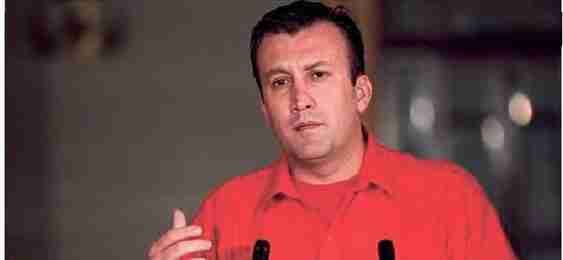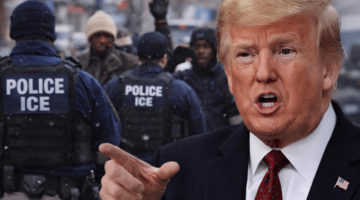BY FABIOLA SANCHEZ AND JOSHUA GOODMAN
Associated Press
CARACAS, Venezuela – Venezuela’s government condemned U.S. sanctions on the country’s vice president, saying Tuesday that the Trump administration’s designation of Tareck El Aissami as a major drug trafficker represented an unprecedented and “highly dangerous” infringement on the South American nation’s sovereignty.
In a series of defiant messages posted on social media, El Aissami said the “miserable and defamatory aggression” only deepens his commitment to revolution started by the late Hugo Chavez and won’t distract him from his job of rescuing Venezuela’s crashing economy from what he called sabotage by its conservative opponents.
“They’ll never be able to defeat our unbreakable resolution to be free forever,” El Aissami said.
On Monday, the Trump administration froze El Aissami’s U.S. assets and banned him from entering the U.S. for his alleged role facilitating cocaine shipments from Venezuela. El Aissami is the highest-ranking Venezuelan official to ever be sanctioned by the U.S. and his designation as a drug kingpin is bound to ratchet up tensions between the two countries, who have not exchanged ambassadors since 2010.
But whether the action signals a hardening U.S. stance toward President Nicolas
Maduro’s socialist government, or is just a carry-over of policies set in motion by the Obama administration, remains to be seen, analysts said. Under Obama, the U.S. was careful not to call for the unpopular Maduro’s removal, as the opposition has been seeking, choosing instead to support a Vatican-sponsored dialogue aimed at avoiding bloodshed.
“Patience has worn out,” said Chris Sabatini, editor of Latin America Goes Global, a website that tracks U.S. policy toward the region. “There’s a mounting sense of frustration, even in the State Department and on the Hill, that the dialogue is going nowhere.” For now, no additional actions against Venezuela are in the works, said a White House official, speaking on condition of anonymity because he was not authorized to discuss policy. It’s also not clear whether Trump personally signed off on the sanctions, although in conversations over the weekend with the presidents of Peru and Colombia he raised concerns about Venezuela’s deteriorating humanitarian situation.
Trump’s newly confirmed Treasury secretary, Steve Mnuchin, told reporters on Tuesday the sanctions “demonstrate the president’s seriousness about fighting the scourge of drugs in the United States.” Trump, he said, also wanted “to send a clear message to the people of Venezuela that America stands with them.”
In remarks carried on state television Tuesday, Maduro accused the U.S. government of committing a “grave error” and said Venezuela would deliver a “note of protest” to the U.S. Embassy in Caracas demanding the accusations against El Aissami be retracted.
Maduro pledged his full support of El Aissami and said he hoped the new U.S. administration would not go down “the same path of defeat and failure” as the previous two U.S. presidential administrations in relations with Venezuela. “Bandits,” he said. “They are the bandits.”
Unlike previous sanctions, issued under legislation allowing Obama to go after Venezuelan officials accused of human rights abuses, the latest asset seizure was carried out by the Treasury Department under two-decade-old drug kingpin legislation that in theory is driven by law enforcement investigations. The U.S. Embassy in Caracas, in announcing the sanctions, made no mention of El Aissami’s position inside Venezuela’s government.
El Aissami, 42, has been the target of U.S. law enforcement investigations for years, stemming from his days as interior minister when dozens of fraudulent Venezuelan passports ended up in the hands of people from the Middle East, including alleged members of Hezbollah.
Before he was extradited from Colombia in 2011, Venezuela’s top convicted drug trafficker, Walid Makled, told authorities he paid bribes through El Aissami’s brother to Venezuelan authorities so they would turn a blind eye to cocaine shipments that have proliferated in the country’s ports and airports during the past two decades of socialist rule.
The action Monday made no mention of any ties to Hezbollah but said El Aissami had worked with prominent drug traffickers in Mexico and Colombia to oversee multiple U.S.-bound cocaine shipments from Venezuela. Also sanctioned was Samark
Lopez, a Venezuelan businessman the U.S. described as El Aissami’s primary front man, who is accused of laundering proceeds from the drug trade through a network of companies and luxury real estate properties in the U.S., Panama, British Virgin Islands and Venezuela.
Venezuela’s foreign minister, Delcy Rodriguez, in a statement praised El Aissami as a prominent criminology expert who as interior minister fought Colombian cartels operating on Venezuelan soil and extracted 21 drug traffickers wanted by the U.S. She also criticized the head of the U.S.
Embassy in Venezuela – the countries haven’t exchanged ambassadors since 2010 – of trying to subvert Venezuela’s constitutional order and boost the opposition’s campaign to carry out a “political coup.”












No Comment